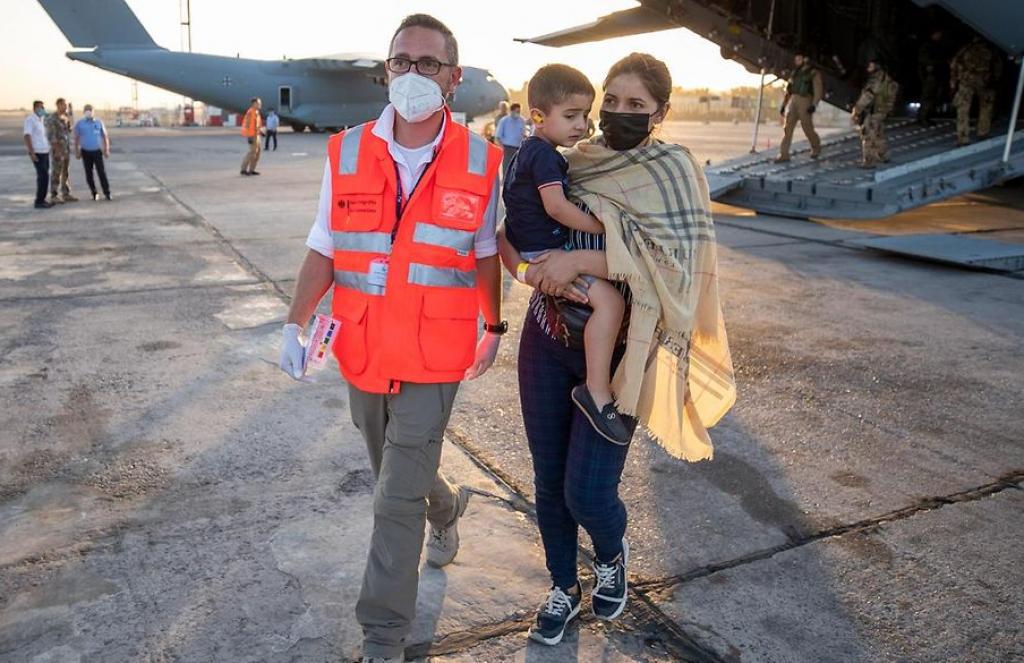Thessaloniki gets ready for its metro launch in November
The underground rapid transit lines have been under construction for almost two decades due to various project delays
 TheMayor.EU logo
TheMayor.EU logo 
The evacuated people on Wednesday, disembarking in Frankfurt Airport, Source: Marc Tessensohn / Bundeswehr (The German Armed Forces)
600 German soldiers will secure the airport in Kabul to help with the evacuations
After a German plane evacuated 500 people out of Kabul on Wednesday, 18 August, including 202 Afghans, many federal states are now vowing to take in displaced people. In a move, somewhat reminiscent of Germany’s 2015 ‘open-door’ policy on refugees, more and more states are signalling they are ready to take on a limited amount of people fleeing the conflict. However, authorities are also very careful to not bite off more than they can chew, especially with the upcoming election in September.
This time the response to the coming refugee wave is milder and state administrations are trying to proceed with caution, order and restraint, as the federal election is just around the corner. A lot of officials want to avoid repeating the mistakes that led to the galvanisation of Germany’s far-right, as in 2015 this led to the formation and rise of the AfD (Alternative for Germany).
Angela Merkel’s successor candidate in the CDU Armin Laschet spoke out on Twitter, calling authorities to help the allies of NATO, mayors, teachers, activists, and women who are in particular danger. At the same time, he was adamant that the 2015 Syrian War debacle should not be repeated.
He continued: “The West has to be reliable. Therefore, the evacuation operation must begin immediately.”
Later that day, the Federal Government approved a mandate for 600 soldiers deployed at the Airport in Kabul to help secure the evacuation mission. The deployment will cost 40 million euros.
German states signalled that they are preparing to accommodate thousands of refugees from Afghanistan with the most populous of them - North Rhine-Westphalia vowing to take 1,800 people.
The state chancellery in Düsseldorf explained that this would include 800 local Afghan nationals who have worked for Germany in recent years. The other 1,000 spaces are planned primarily for women in the fields of civil rights, arts and journalism.
Baden-Württemberg, on the other hand, concluded that they can take in up to 1,100 workers that are already in Germany, including their relatives from Afghanistan. At the same time, Lower Saxony can provide accommodation for at least 400 people in their migrant facilities
Bremen also announced that it would offer up to 150 places for local Afghan workers and their families. Interior Senator Ulrich Mäurer was quoted saying: “Leaving them behind and now handing them over to the Taliban is out of the question. We can talk about the allocation formula later.”
Schleswig-Holstein is getting ready to take in 300 women and children and Hamburg offered to accommodate at least 200 displaced. The first arrivals were expected in the Hanseatic city on 18 August.
Several Bavarian cities also declared that they can take in people. The mayor of Munich, Verena Dietl offered shelter for 260 displaced without any red tape process. Nuremberg and Regensburg put forward similar offers.
Mecklenburg-Western Pomerania is planning to adopt an allocation formula under which they will take in 2% of refugees. Rhineland-Palatinate, Hesse, Thuringia, Saxony, Saxony-Anhalt and Saarland were open to the principle of taking in families, however, they still have not given any concrete figures.
Some states reported logistical trouble, as half of the capacity in refugee centres in Rhineland-Palatinate is already occupied and full occupancy is not possible because of the pandemic.

The underground rapid transit lines have been under construction for almost two decades due to various project delays

Now you can get your wine in Talence by paying directly in Bitcoin

That’s because the state has to spend money on updating the railway infrastructure rather than subsidizing the cost of the popular pass

Rethinking renewable energy sources for the urban landscape

The examples, compiled by Beyond Fossil Fuels, can inform and inspire communities and entrepreneurs that still feel trepidation at the prospect of energy transition

Now you can get your wine in Talence by paying directly in Bitcoin

The 10th European Conference on Sustainable Cities and Towns (ESCT) sets the stage for stronger cooperation between the EU, national and local level to fast track Europe's transition to climate neutrality.

At least, that’s the promise made by the mayor of Paris, Anne Hidalgo

The underground rapid transit lines have been under construction for almost two decades due to various project delays

At least, that’s the promise made by the mayor of Paris, Anne Hidalgo

Hostal de Pinós is located in the geographical centre of the autonomous region

Despite its church-y name, the district has long been known as the hangout spot for the artsy crowds

Urban dwellers across the EU are having a say in making their surroundings friendlier to people and the environment.

Forests in the EU can help green the European construction industry and bolster a continent-wide push for architectural improvements.

Apply by 10 November and do your part for the transformation of European public spaces

An interview with the Mayor of a Polish city that seeks to reinvent itself

An interview with the newly elected ICLEI President and Mayor of Malmö

A conversation with the Mayor of Lisbon about the spirit and dimensions of innovation present in the Portuguese capital














